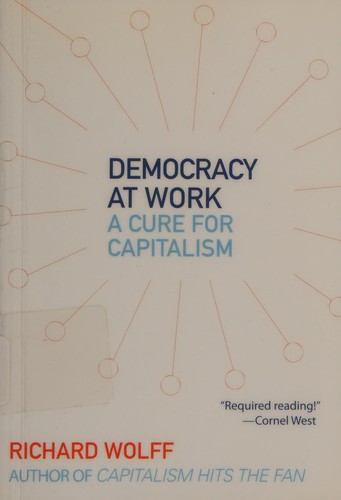- Rating
- Category
- non-fiction
- Read
- 2013-05-24
- Pages
- 220
I picked up some new ideas though wasn’t too familiar with anti-capitalist philosophy in the first place. You can skip the first half if you’re familiar with the depression, GFC, and other poster child capitalism failures, it’s just a light introduction.
Wolff moves beyond the market vs planning and private vs state ownership dichotomies that are traditionally associated with socialism:
“This book is written from the standpoint of this new way of thinking, which is called “surplus analysis.” From the standpoint of surplus analysis, what defines an economic system—for example, capitalism—is not primarily how productive resources are owned nor how resources and products are distributed. Rather, the key definitional dimension is the organization of production. More precisely, the definitional priority concerns how the production and distribution of the surplus are organized.”
He classifies classic socialist/communist states like Russia as actually state capitalism that never actually achieved the necessary alignment of surplus production and appropriation/distribution:
“But here we face a dilemma. Most of the anticapitalist movements that called themselves “socialist” in the last century did not prioritize, explicitly include, or—if they came to power—institute an economic system in which the production and distribution of surplus were carried out by those who produced it. That is also true of those that called themselves “communist.” Instead, these terms and the differences between them were defined in classic terms of private versus state ownership of the means of production and of market versus planning mechanisms of distribution of resources and products.”
The book finishes with some good contrasts between the proposed WSDE (Workers’ Self-Directed Enterprises) and coops, worker-owned, and other familiar arrangements, structural examples of how they cater to both “surplus producers” (makers) and “enablers” (lawyers, cleaners, etc support staff), comparisons of incentive alignment with capitalist structures, and proposals for moving forward.
Though he did indirectly address potential downsides of WSDEs (i.e. suggesting worker rotation, training, and management-elections to address the fact that it’s a different skill set to producing to run a company), I would have liked him to tackle them directly. I did appreciate his concluding remarks:
“It means moving from one set of problems that have become increasingly unbearable to a new and different set that we prefer. WSDEs—and an economic system founded on them—will no doubt have contradictions and tensions. The people caught up in them will struggle over them, much as people have struggled in and over capitalism’s contradictions. However, the struggles over WSDEs will differ from those over capitalist (or other exploitative) organizations of production because they will no longer involve the tensions and conflicts between those people who produce and those who appropriate the surpluses. Similarly, because a system of WSDEs will likely have much less inequality of income among participants in the work of enterprises, that inequality too will figure far less prominently in its struggles.”
